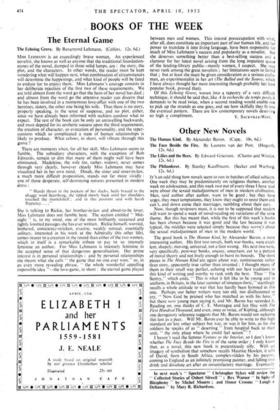BOOKS OF THE WEEK
The Eternal Game
The Echoing Grove. By Rosamond Lehmann. (Collins. 12s. 6d.) Miss LEHMANN is an exceedingly brave woman. An experienced novelist, she knows as well as anyone that the traditional foundation- stones of the novel, dumped in three solid lumps, are : the story, the plot, and the characters. In other words, the reader must be kept wondering what will happen next, what combination of circumstances will determine the happenings, and what kind of people will be fated to endure (or to enjoy) them. Miss Lehmann's courage consists in her deliberate rejection of the first two of these requirements. We are told almost from the word go that the hero of her novel has died ; and almost from the word go the attentive reader can discern that he has been involved in a momentous love-affair with one of the two heroines, sisters, the other one being his wife. Thus there is no story, properly speaking, in the sense of suspense, and no plot, either, since we have already been informed with reckless candour what to expect. The rest of the book can be only an unravelling backwards, and must depend for its aesthetic success upon the third requirement, the creation of character, or evocation of personality, and the reper- cussions which so complicated a state of human relationships is likely to produce. What echoes, in short, will vibrate through this grove ?
There are moments when, for all her skill, Miss Lehmann seems to fumble. The subsidiary characters, with the exception of Rob Edwards, remain so dim that many of them might well have been eliminated. Madeleine, the wife (or, rather, widow), never comes through very clearly, however clearly Miss Lehmann may have visualised her in her own mind. Dinah, the sister and sister-in-law, a much more difficult proposition, stands out far more vividly : one of those desperate, self-destroying natures presented in modern dress :
" Hands thrust in the pockets of her slacks, heels braced in the shaggy wool hearthrug, she tipped slowly back until her shoulders touched the mantelshelf ; and in this position said with harsh flippancy...."
She is talking to Rickie, her brother-in-law and about-to-be lover. Miss Lehmann does not fumble here. The section entitled " Mid- night " is, to my mind, one of the most brilliantly sustained and tightly knotted passages she has ever written. Rickie himself, worried, bothered, conscience-stricken, evasive, weakly sensual, essentially solitary, interested in his work at the Admiralty (his other life), comes nearer to a creation in the round than either of the two women, which in itself is a remarkable tribute to pay to so intensely feminine an author. For Miss Lehmann is intensely feminine in the accepted sense of that dangerous generalisation. Het prime interest is in personal relationships ; and by personal relationships she means what she calls " the game that no one ever won," or, in an even more revealing phrase, the whole wonderful appalling impossible idea "—the love-game, in short : the eternal game played between men and women. This intense preoccupation with what, after all, does constitute an important part of our human life, and her power to translate it into living language, have been responsible for much of Miss Lehmann's success and popularity as a novelist. But she deserves something better than a best-selling success and a clamour for her latest novel arising from the long impatient queue of the lending-library public—mostly women, I suspect. She may never rank among the great novelists ; her limitations seem to forbid that ; but at least she must be given consideration as a serious crafts- man, an experimentalist in her art (The Ballad and the Source, which I have always thought her most interesting though probably her least popular book, proved that).
Of this Echoing Grove, woven into a tapestry of a very difficult technique, it should be said that, like A la recherche du temps perdu, it demands to be read twice, when a second reading would enable one to pick up the strands as one goes, and see how skilfully they fit into the eventual pattern. There are few contemporary novels deserving


































 Previous page
Previous page